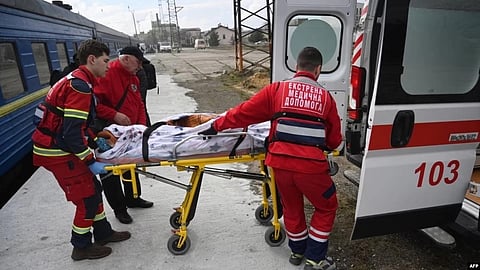
- Home
- NewsGram USA
- India
- न्यूजग्राम
- World
- Politics
- Opinion
- Entertainment
- On Ground
- Culture
- Lifestyle
- Economy
- Sports
- Sp. Coverage
- Misc.
- NewsGram Exclusive
- Jobs / Internships
- Interview

Medical workers transfer a wounded civilian patient from a train to an ambulance upon his arrival from the east of Ukraine in the western Ukrainian city of Lviv.
Ukraine
The United Nations said Tuesday the number of confirmed civilian deaths in Ukraine since Russia launched its full-scale invasion neared 8,500, with more than 14,000 injured.
Ukraine said it is resuming electricity exports to other European countries, having stabilized its own power grid after months of Russian attacks during the winter.
Ukraine and Russia exchange hundreds of prisoners of war. Some of the freed troops from both nations are reportedly in poor shape and will likely require medical care.
Belarus is asking for security guarantees from Moscow. The president of the country, which is hosting a contingent of Russian troops, wants assurances that Russia would defend Belarus if it was attacked.
The United Nations said Tuesday the number of confirmed civilian deaths in Ukraine since Russia launched its full-scale invasion neared 8,500, with the true figure likely much higher.
The Office of the U.N. High Commissioner for Human Rights said in a statement that in addition to those killed, it also confirmed more than 14,000 civilians had been injured.
"OHCHR believes that the actual figures are considerably higher as the receipt of information from some locations where intense hostilities have been going on has been delayed and many reports are still pending corroboration," the agency said. "This concerns, for example, Mariupol (in the Donetsk region), Lysychansk, Popasna and Sievierodonetsk (in the Luhansk region), where there are allegations of numerous civilian casualties."
The U.N. said in the first nine days of April it confirmed 44 civilian deaths, with all but one coming as a result of "explosive weapons with wide area effects."
Ukraine faced months of Russian attacks during the winter targeting its energy infrastructure, in what Kyiv said was an attempt by Moscow to demoralize Ukrainians by knocking out power and water to their homes and businesses.
On Tuesday, however, Ukraine Energy Minister Herman Halushchenko said the country now was not only meeting domestic needs but also ready to restart exports to European countries. He said the exports were a clear message that Moscow's attempt to weaken Kyiv by targeting its infrastructure did not work.
He credited the "titanic work" of Ukraine’s engineers and international partners for making the excess energy supply possible.
Prisoner exchange
Russia and Ukraine have traded more than 200 soldiers in their latest prisoner swap, officials said Monday.
Russia's Defense Ministry said 106 of its soldiers were released from Ukrainian custody, while Andriy Yermak, Ukrainian President Volodymyr Zelenskyy's chief of staff, said that Russia freed 100 Ukrainian prisoners.
Neither announcement disclosed details of how the prisoner exchange was carried out. Yermak said on Telegram that some of the Ukrainian soldiers have severe injuries and illnesses.
He said the latest of the sporadic prisoner swaps during the 14-month war was "not an easy one," but did not elaborate. Exchanging prisoners is one of the few areas of cooperation between Ukraine and Russia.
Ukraine's Coordination Headquarters for the Treatment of Prisoners of War alleged that almost half of the 80 men and 20 women soldiers who returned home "have serious injuries, illnesses or have been tortured," although it offered no evidence for its claims.
Ukrainian news reports said one of the female prisoners returned is Valeriia Karpilenko, a border guard who had helped defend Mariupol's Azovstal steel plant. Last May, she married a Ukrainian soldier in the steel plant's basement while Russian forces surrounded the complex, but her husband was killed three days later.
The Russian Defense Ministry said the freed Russians were being flown on military transport planes to Moscow for medical treatment and rehabilitation.
[VOA/NS]
